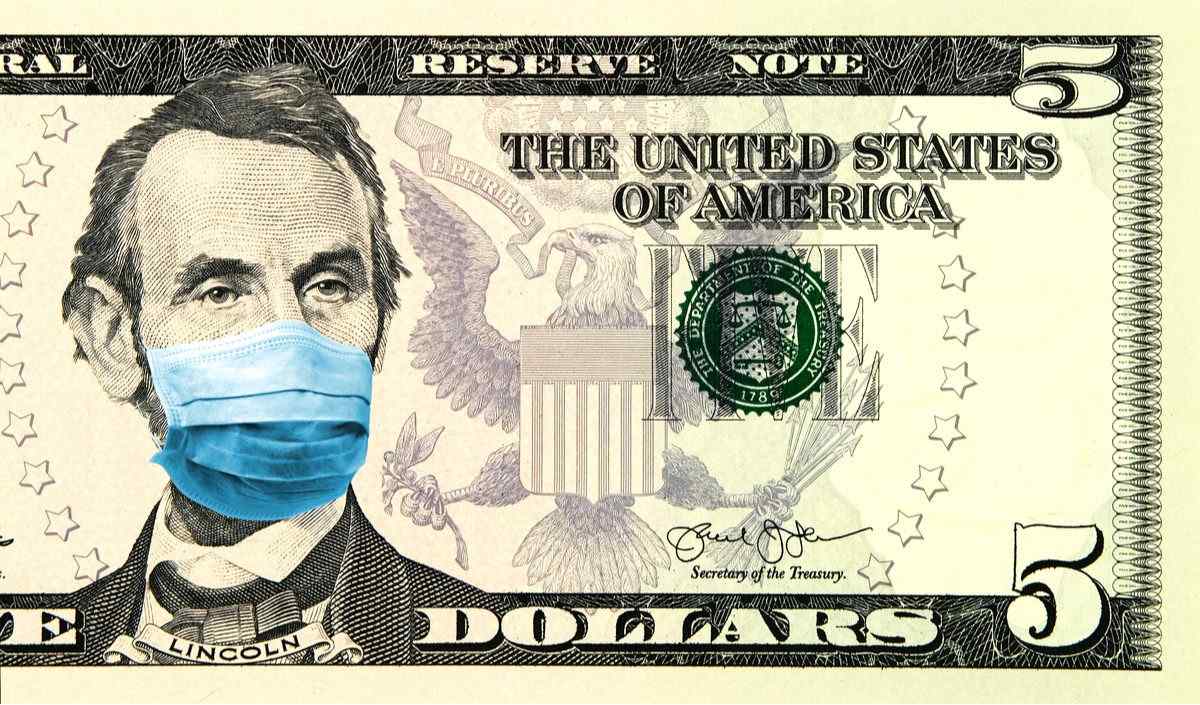Personal and Business Budgeting Tips During a Recession
Economic patterns show that recessions typically occur every four years in the United States. In fact, according to the National Bureau of Economics, a growing economy usually lasts an average of 38.7 months which is around three years, while recessions can last an average of 17.5 months (a year and a half).
A recession is a period of a fiscal downturn during which personal and corporate earnings drop, and during which it becomes difficult to pay down debts and jobs become hard to come by. According to Forbes, during recessions, “the gross domestic product growth rate – the amount of stuff we produce and sell – is negative for two or more consecutive quarters.”
At the time of writing, the novel coronavirus has increased financial precarity and experts predict a financial recession to come. A period of economic downturn can not only affect your personal finances but can also have an impact on your business monetary standings. It can be crucial to have a plan ahead of time to avoid the negative consequences that come with failing monetary infrastructures. We discuss ways you can be better prepared with some personal and business budgeting tips, below.
Personal Budgeting Tips

There are steps that you can take to be better prepared for financial losses during recessions. The following money management and budgeting tips can help you make it out on the other side, minimally financially scathed.
Diversify Your Portfolio
Diversifying your portfolio means that you disperse your investments. This can help to lower how vulnerable your portfolio is to losses, over time. And while this practice does not mean that you are protected from losses, it can help to balance overall reward and risk.
To diversify your portfolio, you can utilize asset allocation funds, which are funds that have a predetermined organization and combination of bonds and stocks. You can also diversify manually, by making sure that your investments are not centered within the same spheres. And if you have some capital, you can customize with unique stocks and bonds.
Have an Emergency Fund
Studies show that most Americans do not have emergency funds and that many do not know how to make a budget. According to a survey from Bankrate, only 40% of individuals are able to cover an unexpected expense of $1,000.
It is important to have enough money saved to protect yourself in the event of a financial emergency. Experts advise that you save a portion of your income every month, and roughly 15% of your yearly income.
And budget management does not have to be difficult; you can also follow the 50/30/20 budgeting rule that stipulates only spending 50% of your income on necessities, 30% on personal needs, and at least 20% on savings. Having money stored can lessen the financial strain that typically comes with recessions.
Reevaluate Your Retirement Contributions
One in three Americans has less than $5,000 in retirement savings, according to a 2018 Northwestern Mutual study. Not only should you be contributing your retirement funds, but experts also advise that individuals max out their contributions if they are able. This can be especially crucial on the eve of a recession.
Maxing out contributions to your IRA or 401(k), if you are in the position to do so, can help you compound your interest rates and grow wealth for the long-term, quicker. You can contribute a maximum of $19,500 a year if you are under the age of 50, and $26,000 if you are over that age.
You should also avoid taking money out of your retirement funds prematurely. During a recession, liquid assets can be essential.
Consult a Financial Expert
Financial advisors can be useful resources for financial planning. Advisors can give you information regarding smart investments, specific money moves to make, and budgeting tips. They can also access your general financial standing and are able to offer an objective view of your spending habits and ways you could be spending your money better.
You can also consider opting for credit counseling from a credit union or a religious organization.
Business Budgeting Tips

Beyond your personal finances, recessions can also wreak havoc on your business. Here are some steps you can take to prepare your business for a slump.
Reduce Your Expenses
It is important for you to differentiate between discretionary and necessary spending. Evaluate your business expenses and determine what you can do without. Lowering your discretionary spending, which is nonessential spending, can give you more financial wiggle room.
Depending on what your business is, discretionary spending that you can cut may include aesthetic functions you might not need, travel expenditures that may not be necessary, or even office or building spaces that prove wasteful. While it may not be possible to lower your fixed expenses, determining where you can cut costs can provide you with some cash padding in the event of a recession.
Diversify Your Revenue
Similar to how diversifying your investment portfolio can help your personal finances, diversifying your buyer pool can better protect your business.
Experts suggest expanding your buyer base if a single customer makes up more than 10% of your total business revenue or if your top five clients make up more than 25%. You can expand your pool by focusing on marketing campaigns that will draw in new customers or by adding additional revenue streams to your main sources of profits.
You can also offer complementary services or products to gain new clientele or network with other businesses in your sector to expand your customer base.
Keep Your Debts Low
It is advisable to pay down debt before a recession hits. Debts can compound quickly and create a domino effect on your expenses that can leave you monetarily drained and unprepared for a financial slump. Consider creating a debt-reduction strategy, calling your creditors to see what your options are, or consolidating some of your debts.
It is also important that you do not take out additional loans or unnecessary lines of credit that your company is unable to afford, before or during a recession. Being proactive with your debt in this way can save you in the long-run.
Secure Some Financing
Businesses can often struggle with their finances from the get-go. In fact, a large number of businesses fail due to a lack of financing plans. And studies have shown that one of the top 10 reasons businesses fail is due to a lack of cash (29%) and other cost issues (18%).
While getting your business financed during a recession can be difficult, doing so ahead of time in preparation for an economic slump can prove critical.
One way you can do this is by securing a business line of credit. These lines of credit operate like personal credit cards and can be opted for whenever funds are needed for your business.
Depending on what your business needs are, you can take out as little as $1,000 or as much as $1 million. You can work with a lender to determine the right amount of credit to take out. Most lenders will require that you have a minimum of two years of business operating experience, some form of collateral, in addition to proof that your business is profitable and can make enough revenue to pay off your outstanding debts.
Have Some Money Saved Up
Experts advise business owners to have liquid assets or cash saved up, in case of an emergency. Such assets should typically be around three to six months’ worth of your company’s operating costs.
Having cash squirreled away can provide your business with an extra cash padding that might be needed in a recession.
Some ways to save money in your business are:
- Get sponsors
- Cut extraneous expenses
- Focus on out-of-the-box money-generating marketing plans
- Hire fewer, more experienced employees
- Review every expense to see where you can lower costs
- Buy in bulk
- Streamline your distribution process
Know Your Competition
Recessions typically bring tighter and more competitive markets. Because individuals are spending less and there’s less money to go around, it is important that you know your competition and are able to do what your competitors do better.
You have to research your competitors and analyze what areas of your business that you can improve. Are there strategies that you can implement that will make your business stand out? Are there things your competitors are doing that you can adopt and adapt?
It is important that in the process of squaring up your competitor, that you don’t lose what makes your own business unique. Being the best in your field can sometimes mean thinking outside of the box and doing something that no one else is.
Pay Attention to Recession Patterns
Recessions affect businesses in different ways. During fiscal downturns, some sectors actually thrive, while others are devastated by economic costs. It is important to understand your business sector fully, pay attention to key indicators, and make educated predictions about how your business might be specifically impacted by a recession.
Thinking ahead in this way can help you determine what products you may need to recession-proof, key areas to focus on, and protective services you may need to add.
You can also consider consulting a financial expert or team to determine where the potential problems in your company may be and what steps are necessary to protect your business.
Bottom Line
The thought of an impending recession can cause both monetary and emotional financial strain. But periods of fiscal downturns are a part of the fabric of most economies. Planning ahead, making a budget, saving money ahead of time, and being proactive, as highlighted in some of the personal and business budgeting tips above, can help to mitigate such stressors.
If you find yourself in a situation in which you are unable to make ends meet due to a recession, you can consider seeking local and federal aid, opting for an installment loan, or for a cash advance online, in the form of payday loan. Payday loans online may be able to provide financial relief during periods of monetary instability.





